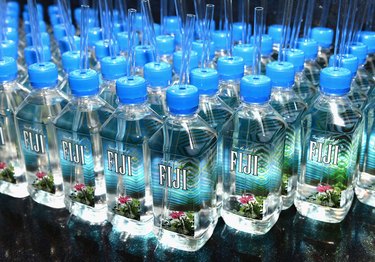
Fiji water benefits your skin, keeps you hydrated and balances your electrolyte levels — according to its proponents. Health bloggers and salespeople alike call it the "Earth's Finest Water," but can you really trust these claims?
While it's true that good hydration supports optimal health, not all waters are created equal.
Video of the Day
Video of the Day
What Is Fiji Water?
Health organizations worldwide emphasize the importance of proper hydration. The American Academy of Family Physicians, for example, states that water is the best choice as a beverage since it contains no calories or sugars. Harvard Health Publishing recommends drinking 30 to 50 ounces of water per day and watching out for any signs of dehydration, such as dark urine, dizziness and weakness.
Read more: 12 Ways to Make Water Taste (Much) Better
Considering these facts, it's not surprising that bottled water has emerged as one of the healthiest beverages worldwide. Fiji water is no exception. This drink has been around for more than two decades and can be found on store shelves in over 60 countries, according to its manufacturers.
Fiji water is marketed as a brand of artisan water that comes from the tropical islands with the same name. It's derived and shipped from Fiji and boasts a unique mineral profile, as the manufacturers point out. According to Fiji Water, this beverage is rich in electrolytes and has a pH of 7.7, which is significantly higher compared to pure water.
Fiji Water Ingredients
Manufacturers promote this beverage as a natural source of minerals and electrolytes, such as calcium, magnesium and potassium. One liter of Fiji Water (33.8 ounces) provides the following nutrients:
- 14.7 milligrams of magnesium
- 17.9 milligrams of calcium
- 4.9 milligrams of potassium
- 93.4 milligrams of silica
- 17.8 milligrams of sodium
- 0.2 milligrams of fluoride
- 9.3 milligrams of chloride
Take calcium, for example. This mineral supports bone health, nerve transmission and cardiovascular function. It also plays a role in hormone production.
The National Institutes of Health recommends 1,000 milligrams of calcium per day for healthy adults aged 19 to 50 years. One liter of Fiji Water delivers 1.79 percent of the daily recommended calcium intake. Generic bottled water, by comparison, boasts around 100 milligrams of calcium per liter, according to the USDA. The same amount of Evian water provides 80 milligrams of calcium.
Read more: The Top 10 Beverages to Avoid
Fiji Water also contains 14.7 milligrams of magnesium per liter. That's not too much, considering that one liter of generic bottled water has around 20 milligrams of magnesium, or 5 percent of the daily recommended intake. Fiji Water, though, is higher in potassium, a mineral that regulates blood pressure, heart rate, nerve function and protein synthesis, among other biological processes.
Does It Have Any Benefits?
This beverage provides decent amounts of minerals, so it may benefit your health. Plus, it keeps you hydrated. A major advantage is that it's significantly lower in contaminants than tap water.
According to a June 2015 report released by Fiji Water, its levels of arsenic, barium, fluoride and nitrates are below the FDA's limits. Furthermore, it contains no cyanide, aluminum, benzo(a)pyrene, nitrites and other potentially harmful compounds.
Considering its mineral content, it's fair to say that Fiji Water benefits your health. It not only quenches your thirst but also contributes to your daily nutrient intake.
But is this drink really that safe? After all, it comes in plastic bottles. Manufacturers claim that their bottles are made from quality PET (polyethylene terephthalate) plastic and contain no BPA, or Bisphenol A. This chemical can leach into water and may contribute to metabolic disorders, hormonal imbalances and certain cancer in the long run.
Since Fiji Water is free of BPA, it can be considered safe. Additionally, bottled water is regulated by the FDA and must comply with strict safety standards.
What about the Fiji Water controversy? For years, this company has been accused of environmentally misleading claims. Although its plastic bottles are BPA-free, they may still harm the environment.
Read more: 10 Ways to Reduce Your Use of Plastic
According to Augsburg University and other organizations, PET bottles often end up in the water or soil. In fact, up to 75 percent of all plastic bottles in the U.S. are never recycled. Additionally, plastic bottle production increases green gas emissions, which further affects the environment. This problem, though, is associated with any product that comes in a plastic bottle, from soft drinks to vegetable oil.
- American Academy of Family Physicians: "Hydration: Why It’s So Important"
- Harvard.edu: "The Importance of Staying Hydrated"
- Fiji Water: "About Us"
- Fiji Water: "FAQs"
- Fiji Water: "Our Water"
- NIH: "Calcium"
- USDA: "Generic Bottled Water"
- USDA: "Evian Water"
- USDA: "Nutrition Facts for Bottled Water"
- Harvard.edu: "The Importance of Potassium"
- Fiji Water: "Bottled Water Quality Report"
- NCBI: "Health Risk of Exposure to Bisphenol A (BPA)"
- FDA: "FDA Regulates the Safety of Bottled Water Beverages Including Flavored Water and Nutrient-Added Water Beverages"
- Augsburg University: "Environmental Impacts of Bottled Water"
- NPR: "A Bottled-Water Drama In Fiji"